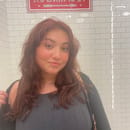As the holidays came and went, another season passed filled with family and friends gathering together in celebration. What seems like an endless amount of turkey dinners is the perfect chance to catch up with extended family members who always politely ask to get a brief update on your life.
Then come the questions: “‘How is school?” “Do you have a job?” “What are you studying again?”
This Christmas, in particular, my family—extended family included—flew south to Chile to visit the rest of my mom’s side of the family. This trip marked my first time back in over 17 years, making it my first official meeting with them as an adult.
Getting a degree in a program with such an open-ended title as “Creative Industries” poses a bit of a challenge when asked to explain what it is I actually do. With the addition of the slight language barrier, I found it even more difficult to communicate exactly what my future career paths could be. This got me thinking, is this something that will happen my entire life? Will my answer to the question “what’s your major?” always be “I’m in business,” just to make it easier?
I have always thought of the arts as a valuable career path for me, so it came as no surprise to my parents when I was deciding between majors that were creativity-driven. Math and science were never my things. With that said, I still can’t distinguish what I want to achieve from something as broad as “the arts” quite yet.
The program I am in—Creative Industries—encourages the concept of involving yourself in multiple disciplines in an effort to figure out what it is you would potentially want to do. With that, the courses I do take can seem all over the place. Half the time, I’m sitting in my classes saying, “what does ‘creative industries’ even mean?” And sometimes, I can’t help but feel as if the flexibility is to my detriment.
I remember in high school one of my guidance counsellors told me, when I was in the midst of another minor panic about my approaching future choices, “You are going to go out into the world where there are jobs you haven’t discovered yet or jobs your generation hasn’t invented yet.” With this revelation dangling in the back of my mind, to this day, I feel a mix of pressure as well as insecurity when given the option of experimenting when it comes to post-secondary education. Aren’t I supposed to know what I’m doing? Aren’t I working towards something?
Answering questions about your degree is one thing, but answering questions about what comes later is terrifying. It never used to be. When I was a kid, I knew exactly what it was—no matter how irrelevant being a professional dolphin trainer/fashion designer/Disney princess is now to what I’m planning to do after graduation. But, if I don’t have an answer yet, is that allowed?
Now, of course, not knowing is absolutely OK. I’ve run into many educators, counsellors, peers, etc. that will say the same. However, I’m sure there is a guilt that exists for some—including myself—when telling your parents that you are unsure of your future when they financially contribute to your education. Is it the same as saying, “I don’t know what you’re paying for, to be honest? I could get a job, but who knows if there will be some gain from this?”
An article I read from 1Granary, a Central Saint Martins-run publication, talks about this same issue with students across their offered art-related degrees. One student writes, “Creativity as a hobby is considered ‘cool.’ Creativity as a profession is considered pitiable.”
As I meet more people throughout my time in this program, the more I encounter young professionals erasing the preconceived idea of the “starving artist” that the older generation may still have. Being involved in a creative field may mean signing up for the pitfalls of financial instability and unemployment, along with having an unhealthy work-life balance. Somehow, that doesn’t leave me, or a big portion of our generation, discouraged.
It is understandable as to where our conflict surrounding creativity as a pastime over a career exists because Gen-X doesn’t come from a world where innovation is central to succession. And with innovation, individuality needs to exist. “Get a real job” now has a different meaning. Real to us is more along the lines of authenticity to your own goals rather than society’s.
I still don’t know what my future may hold, and I’m definitely getting more comfortable with the idea of not knowing for a while. The hope for the future is prosperity in all elements of life, so as long as you continue on the path that you set for yourself, your main goal will always be achieved.


